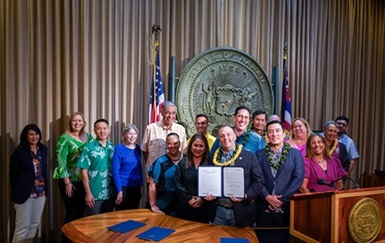 HONOLULU—Governor Josh Green, M.D. signed into law a bill incorporating regenerative tourism frameworks into the Hawaiʻi State Planning Act in a ceremony at his office on June 28, attended by legislative leaders, community proponents, and Hawaiʻi Tourism Authority (HTA) leadership.
HONOLULU—Governor Josh Green, M.D. signed into law a bill incorporating regenerative tourism frameworks into the Hawaiʻi State Planning Act in a ceremony at his office on June 28, attended by legislative leaders, community proponents, and Hawaiʻi Tourism Authority (HTA) leadership.
“Sustainable tourism is essential for the future of our state,” said Governor Green. “This bill ensures that our visitor industry grows in a way that respects and preserves our cultural heritage while promoting economic diversification.”
Senate Bill 2659, introduced by Senators Jarrett Keohokalole and Les Ihara, Jr. and championed by the Native Hawaiian Caucus in both chambers of the Legislature, incorporates a regenerative framework into the Hawaiʻi State Planning Act and the state’s Tourism Functional Plan—documents that guide the operation of state and county agencies—by expanding objectives and policies for the visitor industry, which include:
- Shifting to a regenerative visitor industry that has a smaller ecological footprint by implementing policies such as decreasing the impacts on beaches, reefs, and ocean life, and that aims to sustain and improve the quality of life for Hawaiʻi’s people
- Supporting community efforts to protect the cultural and natural resources of the land, oceans, streams, and skies, and to ensure that kapu (prohibited) and environmentally sensitive contexts are protected from visitor traffic
- Engaging more of Hawai‘i’s businesses by better positioning Hawai‘i business owners and entrepreneurs in the economic value chain, and actively supporting other economic sectors to reduce the state’s dependence on tourism
- Empowering Hawaiʻi’s people by offering capacity-building opportunities, job training and education for upward career mobility in the visitor industry
“This landmark legislation represents a pivotal advancement in solidifying ongoing efforts to transform Hawaiʻi for the better, and I commend Governor Green and the Legislature for their leadership in ushering forth this era,” said HTA Board Chair and Hawaiʻi Lodging & Tourism Association President and CEO Mufi Hannemann. “The united efforts of government agencies and officials, community leaders, and HTA highlight a shared dedication to fostering a thriving, diverse, and resilient industry that places the well-being of our communities and diverse cultural heritage at the forefront.”
This bill was a priority of the ʻĀina Aloha Economic Futures movement, a collaborative initiative to bring to life a resilient economy through a deep and abiding love for Hawaiʻi’s communities and natural environments. In 2020, a group of Native Hawaiian community members came together organically after separate discussions brought forth common sentiments regarding the need to have Native Hawaiian voices, values, and experiences influence Hawaiʻi’s post-pandemic economic recovery. Among the 14 co-authors of the ʻĀina Aloha Economic Futures Declaration was Mahina Paishon, who now serves as Vice Chair of the HTA Board of Directors, and Kalani Kaʻanāʻanā, HTA’s Chief Stewardship Officer.
HTA was an early signatory to the ʻĀina Aloha Economic Futures Declaration and supported Senate Bill 2659 throughout its journey to law.
“HTA heard the community’s call clearly—we need to move toward a regenerative model of tourism that is a net benefit for Hawaiʻi’s environment and communities while continuing to support hundreds of thousands of jobs and many small businesses across the islands,” said HTA Vice Chair Paishon. “That call has driven our actions here at HTA, and this law signifies that regenerative tourism is a priority for our Legislature as well as Governor Green’s administration. We are grateful for their leadership and support.”
Sustainable, responsible, regenerative tourism principles have long been a part of HTA’s plans for tourism that benefits Hawaiʻi. HTA has already begun working with colleagues at the state’s Office of Planning and Sustainable Development on the updates called for in the new law.







